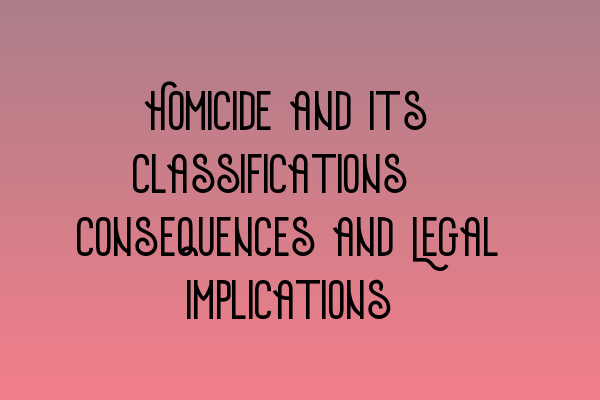Homicide and its Classifications: Consequences and Legal Implications
Welcome to SQE Criminal Law & Practice Law UK, where we provide comprehensive legal resources and expert guidance for aspiring solicitors in the field of criminal law. In this blog post, we delve into the complex and fascinating topic of homicide, exploring its classifications, consequences, and the legal implications associated with this serious offense.
Before we delve into the details, it’s important to define what homicide entails. Homicide refers to the act of unlawfully causing someone’s death, whether it was intentional, accidental, or the result of negligence. It is a criminal offense that is taken very seriously by the legal system and can have severe consequences for the individuals involved.
Classification of Homicide
Homicide can be broadly classified into different categories, each with its own distinct legal implications. Let’s take a closer look at these classifications:
1. Murder
Murder is the most serious form of homicide and involves the deliberate and premeditated killing of another person. In order to secure a murder conviction, the prosecution must prove beyond a reasonable doubt that the defendant intended to cause the victim’s death or cause serious harm resulting in death. Murder convictions can result in lengthy prison sentences or, in some jurisdictions, even the death penalty.
If you are preparing for the SQE 1 exams, make sure to test your knowledge of murder and other criminal law topics with our SQE 1 Practice Exam Questions, designed to help you ace your exams.
2. Manslaughter
In cases where the killing was not premeditated or intentional, but rather the result of recklessness or negligence, the offense is typically classified as manslaughter. Manslaughter can be further divided into two categories:
a. Voluntary Manslaughter
Voluntary manslaughter occurs when a person causes the death of another in the heat of the moment or as a result of a sudden provocation. While the action is intentional, it is committed in the absence of premeditation. The specific criteria for establishing a conviction of voluntary manslaughter vary depending on the jurisdiction.
b. Involuntary Manslaughter
Involuntary manslaughter involves unintentional killings that occur as a result of negligent or reckless behavior. This can include offenses such as drunk driving accidents, medical malpractice, or other actions that lead to someone’s death without the intention to cause harm.
For comprehensive preparation resources and practice mocks for the SQE 1 exams, including topics related to manslaughter, check out our SQE 1 Practice Mocks FLK1 FLK2.
Legal Implications and Consequences
The legal implications and consequences of a homicide conviction can be severe, affecting both the defendant and the victim’s families. Here are some of the key consequences:
1. Imprisonment
A conviction for murder or manslaughter can result in significant prison sentences, ranging from years to life imprisonment, depending on the jurisdiction and the specific circumstances of the case. The length of the sentence will consider factors such as the defendant’s criminal history, the degree of intent, and the presence of aggravating factors.
2. Fines and Compensation
In addition to imprisonment, the courts may also impose fines as a form of punishment. These fines can be substantial and are designed to reflect the seriousness of the offense committed. In some cases, the court may also order the defendant to pay compensation to the victim’s family to alleviate the financial burden caused by the loss of a loved one.
3. Stigma and Public Perception
Beyond the legal consequences, a homicide conviction can have lifelong repercussions on the individual’s personal and professional life. The stigma associated with such a conviction can affect employment prospects, relationships, and a person’s standing within their community. It is important to seek legal representation and support during such challenging times.
4. Impact on Victims’ Families
The impact of a homicide goes far beyond the individuals directly involved. The emotional and psychological toll on the victim’s family and loved ones can be significant and long-lasting. The legal process can provide some semblance of justice and closure for these families, but it cannot completely heal the wounds caused by the loss of a loved one.
If you are preparing for the SQE 2 exams and want to enhance your knowledge of criminal law, explore our comprehensive SQE 2 Preparation Courses, carefully curated to help you excel in your exams.
Conclusion
Homicide is a grave offense with serious legal consequences. Understanding its classifications, implications, and the far-reaching impact it has on individuals and society is crucial for aspiring criminal law solicitors. At SQE Criminal Law & Practice Law UK, we are dedicated to providing reliable resources and expert guidance to help you navigate this complex area of law.
If you are interested in learning more about legal topics, exam preparation, or staying up-to-date with SRA SQE Exam Dates, be sure to explore our wide range of articles and resources on our website.
Disclaimer: The content provided in this blog post is for informational purposes only and should not be construed as legal advice. For specific legal advice regarding homicide and related matters, please consult a qualified solicitor.
